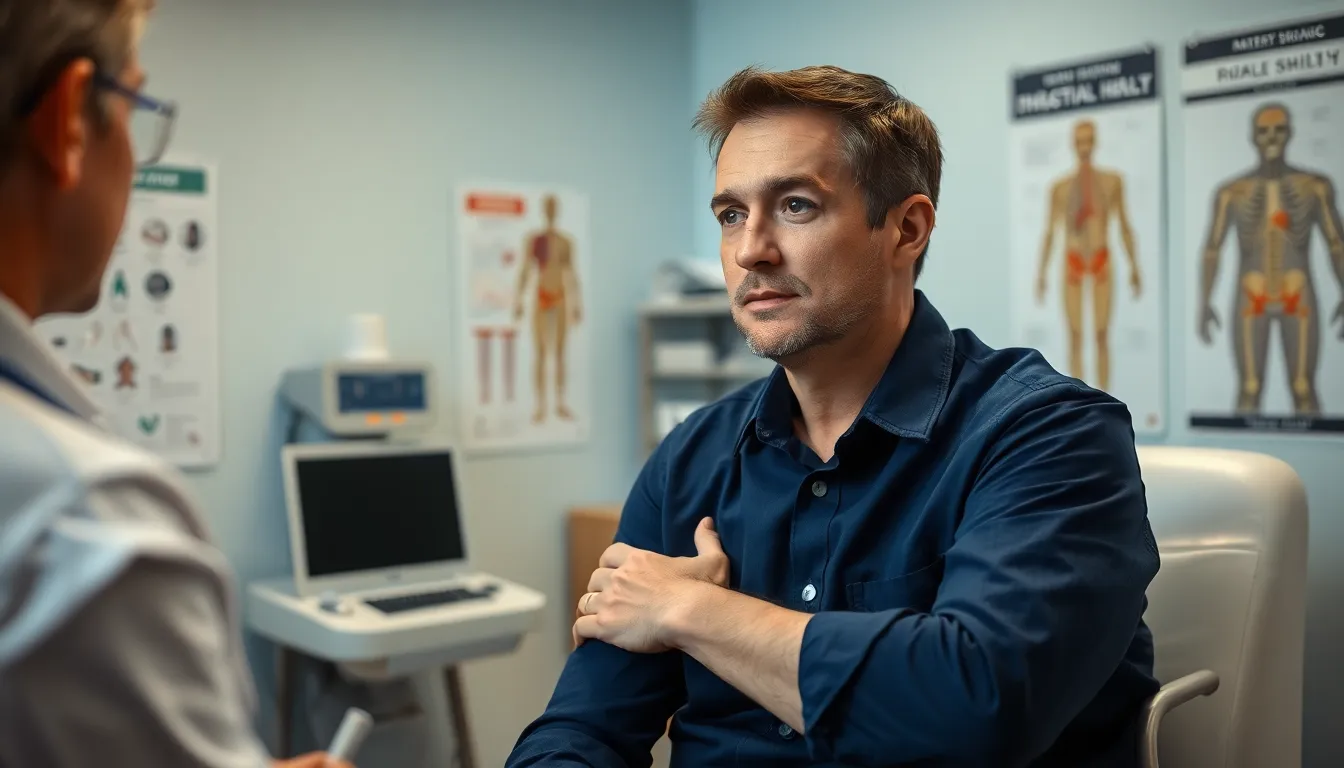Prostate cancer might not be the most popular topic at dinner parties, but understanding its symptoms could save a life. Gentlemen, it’s time to pay attention to what your body’s trying to tell you. Ignoring those subtle signs could lead to a game of hide-and-seek with a serious condition.
From frequent trips to the bathroom that feel like a marathon to discomfort that makes sitting feel like a sport, these symptoms are your body’s way of waving a red flag. It’s not just about being a tough guy; it’s about being a smart guy. So, let’s dive into the signs that might have you saying, “Maybe I should schedule that check-up after all.” After all, a little awareness goes a long way in keeping the prostate—and the rest of you—happy and healthy.
Table of Contents
ToggleOverview of Prostate Cancer Symptoms in Males
Prostate cancer symptoms in males can vary but often include several key indicators. Frequent urination, especially at night, signifies a potential issue. Difficulty starting or stopping urination may also occur, pointing to changes in the prostate. Many men reporting these symptoms notice a weakened urine stream as well.
Discomfort during urination often indicates inflammation or other prostate-related problems. Some men might experience pain in the lower back, hips, or pelvis, which can accompany more severe symptoms. A noticeable decrease in force during urination can suggest prostate obstruction.
Other signs include blood in urine or semen, which requires immediate medical attention. While many of these symptoms can point to benign conditions, their presence shouldn’t be overlooked. Men experiencing persistent discomfort or unusual changes should consult a healthcare professional promptly.
Changes in sexual function can additionally signal advanced prostate cancer. This often includes erectile dysfunction, which may arise alongside other urinary symptoms. Awareness of these indicators facilitates early detection.
Recognizing the nuances of prostate health proves crucial. The earlier the detection, the more effective treatment options can be. Men should prioritize regular check-ups with healthcare providers to address any emerging symptoms. Engaging in conversations about prostate health can significantly impact outcomes.
Common Symptoms

Recognizing symptoms of prostate cancer is vital for early detection. Several signs may indicate potential issues that require medical attention.
Urinary Changes
Frequent urination affects many men, particularly at night. Urgency and difficulty starting or stopping urine flow often accompany these changes. A weak urine stream can further signal problems. Discomfort during urination is another concerning symptom; this can indicate inflammation or the presence of prostate cancer. Blood in urine points to serious conditions—immediate medical evaluation is essential in such cases. Monitoring these urinary symptoms leads to timely consultation with healthcare providers.
Sexual Dysfunction
Erectile dysfunction impacts many men, especially those experiencing prostate issues. Changes in sexual function can result from both physical and emotional factors related to the disease. Decreased libido frequently occurs alongside these symptoms, potentially altering relationships. Difficulty achieving or maintaining erections can indicate advanced prostate cancer. Open discussions about these changes with a healthcare professional may ensure appropriate care and intervention. Prioritizing prostate health contributes to overall well-being and timely treatment.
Less Common Symptoms
Prostate cancer can exhibit less common symptoms that may go unnoticed. Awareness of these signs helps ensure timely medical evaluation.
Pain in the Lower Back
Pain in the lower back, though not exclusive to prostate cancer, often occurs in affected individuals. This discomfort might signify that cancer has spread to nearby areas. Such pain can be persistent or intermittent, making it vital to consult a healthcare professional if it occurs. It’s essential to note any changes in pain patterns, especially if they increase in intensity. Men experiencing this symptom alongside urinary changes should seek medical attention promptly.
Numbness or Weakness
Numbness or weakness in the legs or feet can be concerning. These symptoms may arise if the cancer compresses nerves in the spinal area. Patients might notice difficulty walking or performing everyday activities due to this weakness. Recognizing these sensations as potential indicators of prostate cancer is crucial. Early identification enables better management of the disease, highlighting the importance of discussing any unusual symptoms with a healthcare provider.
Risk Factors and Early Detection
Prostate cancer risk factors include age and family history, contributing to higher susceptibility.
Age and Family History
Age significantly impacts prostate health, with men over 50 facing increased risks. Family history plays a crucial role, as genetics can elevate the likelihood of developing prostate cancer. Men with a father or brother diagnosed with prostate cancer are likely at a greater risk, with studies indicating that having multiple affected relatives raises this risk even further. Ethnic background also influences susceptibility, as African American males show higher rates of diagnosis compared to other groups. Awareness of these factors can guide proactive health measures for those at risk.
Importance of Regular Check-ups
Regular check-ups serve as vital tools in early detection of prostate cancer. Annual screenings, including prostate-specific antigen (PSA) tests and digital rectal exams, help identify changes that may indicate cancer. Depending on risk factors like age and family history, healthcare providers recommend starting these screenings as early as age 40 for high-risk individuals. Discussing symptoms and health history during appointments enables tailored monitoring strategies and timely interventions if necessary. Proactive engagement with healthcare professionals fosters informed decisions about prostate health and enhances the chances of successful treatment outcomes.
Recognizing the symptoms of prostate cancer is essential for early detection and effective treatment. Men should remain vigilant about changes in their bodies and seek medical advice when necessary. Regular check-ups and open conversations with healthcare providers can significantly impact outcomes.
By prioritizing prostate health and staying informed about potential symptoms men can take proactive steps toward their well-being. Awareness and timely action are key to managing health risks and ensuring a better quality of life.


